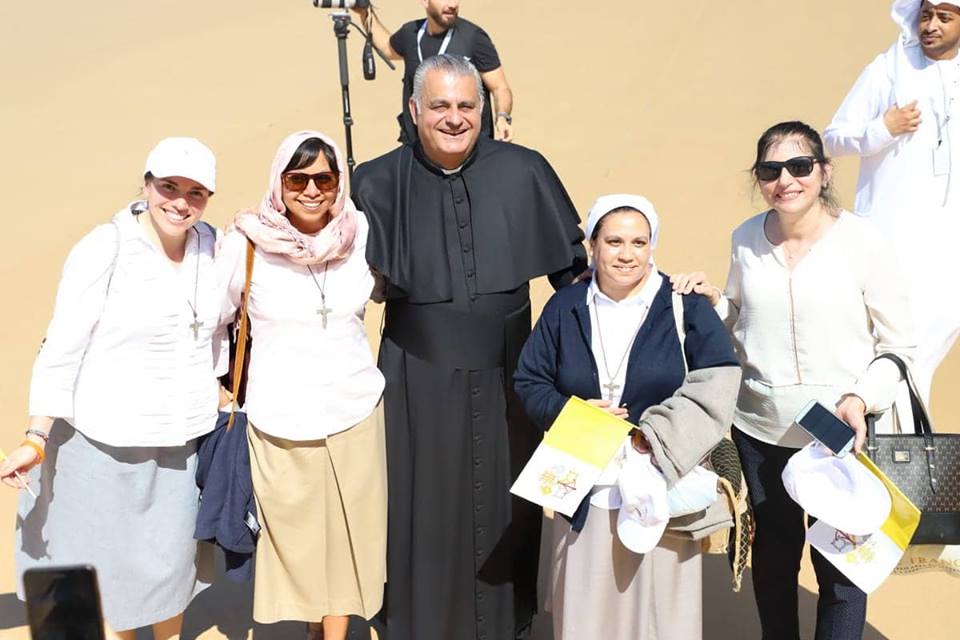Fr. Rif’at Bader of Jordan Tells ZENIT Who Traveled on Papal Flight Why Pope’s Historic Trip to UAE—1st Visit Ever of a Pope to Arabian Peninsula—Is So Important.
What distinguishes the United Arab Emirates? According to a Church official in Jordan, it is its welcome, even with its restrictions, to Christians worldwide, who seek a good livelihood and a safe haven.
Speaking to ZENIT, Fr. Rif’at Bader, Director of the Catholic Center for Studies and Media (CCSM) in Jordan, stressed this, explaining how the Pope’s visit was significant to the Christian community.
Zenit Senior Vatican Correspondent Deborah Castellano Lubov traveled alongside Pope Francis on his papal flight to Abu Dhabi, the capital of the United Arab Emirates, and Fr. Rif’at has been in Abu Dhabi for the Supreme Pontiff’s arrival as an expert of the Holy See’s relationship with the Arab Countries.
The Pope’s visit to UAE marks the first time a Pope has stepped foot in the Arabian Peninsula. He accepted the invitation to visit from the local church and crown prince, on the occasion of the ‘International Interfaith Meeting on Human Fraternity.”
During the Pope’s Feb. 3-5, 2019 visit, the Jesuit Pontiff addressed the interreligious meeting and met with the Muslim Council of Elders in the Grand Mosque of Abu Dhabi. The second day was dedicated to the Catholics in the Muslim country, where he celebrated Mass in a public venue, Zayed Sport City, for 135,000 faithful. This trip marked Pope Francis’ 27th Apostolic Visit abroad, 41st country visited, and his 6th majority-Muslim nation among them.
Speaking on how he has firsthand observed the UAE’s assistance, he shared: “For instance, in Jordan, I have seen that the United Arab Emirates—through the UAE Red Crescent—has helped many displaced Christians from Mosul and Nineveh.”
“Pope Francis’ visit,” the Jordanian priest who defended his doctoral thesis in Lebanon last year about the common values between the Holy See and his country Jordan, expressed, “is going to strengthen the Emirate’s Christians.”
His hope for the trip, Fr. Rif’at said, is that upholding human dignity and rights will always become more important and that the trip “will foster greater cooperation between the East and the West.”
What is interesting about the Christian faithful in the UAE, Fr. Rif’at shared, is that they are not ‘original’ or ‘indigenous’ to the area, but from elsewhere, different than the Christian communities of Lebanon, Iraq, Egypt and Jordan.
“They are transplants,” essentially, but they have found a good protected place,” he said.
The United Arab Emirates is 20 percent local population and 80 percent foreigners. While there are limitations on religious freedom of non-Muslims, overall the nation is considered a model of peaceful coexistence.
To ZENIT, Fr Rif’at shared on Muslim-Christian relations, saying that this trip to UAE, and the March 30-31 trip to Morocco, “witnessed and will witness a new impetus” which will not just complement, “but call for unity among Muslims and Christians, to promote essential issues such as justice, respect for religious freedom, and peace.
The UAE, Fr. Rif’at shared, has been a safe haven to many who have had to flee extremists.
Given that terrorism and users of religion have badly represented Islam in this period, the priest stressed: “This has been an opportunity to have a greater opportunity to dialogue between religions.”
The UAE named 2019 as the Year of Tolerance.
“As Arabs,” Fr. Rif’at said, “We are greatly honored to see the Vatican and the Holy See’s diplomacy regarding our Arab countries and regional issues which have turned into international issues, especially the Palestinian issue and the issue of refugees and the forcibly displaced.”
By: DEBORAH CASTELLANO LUBOV
Source: zenit.org






